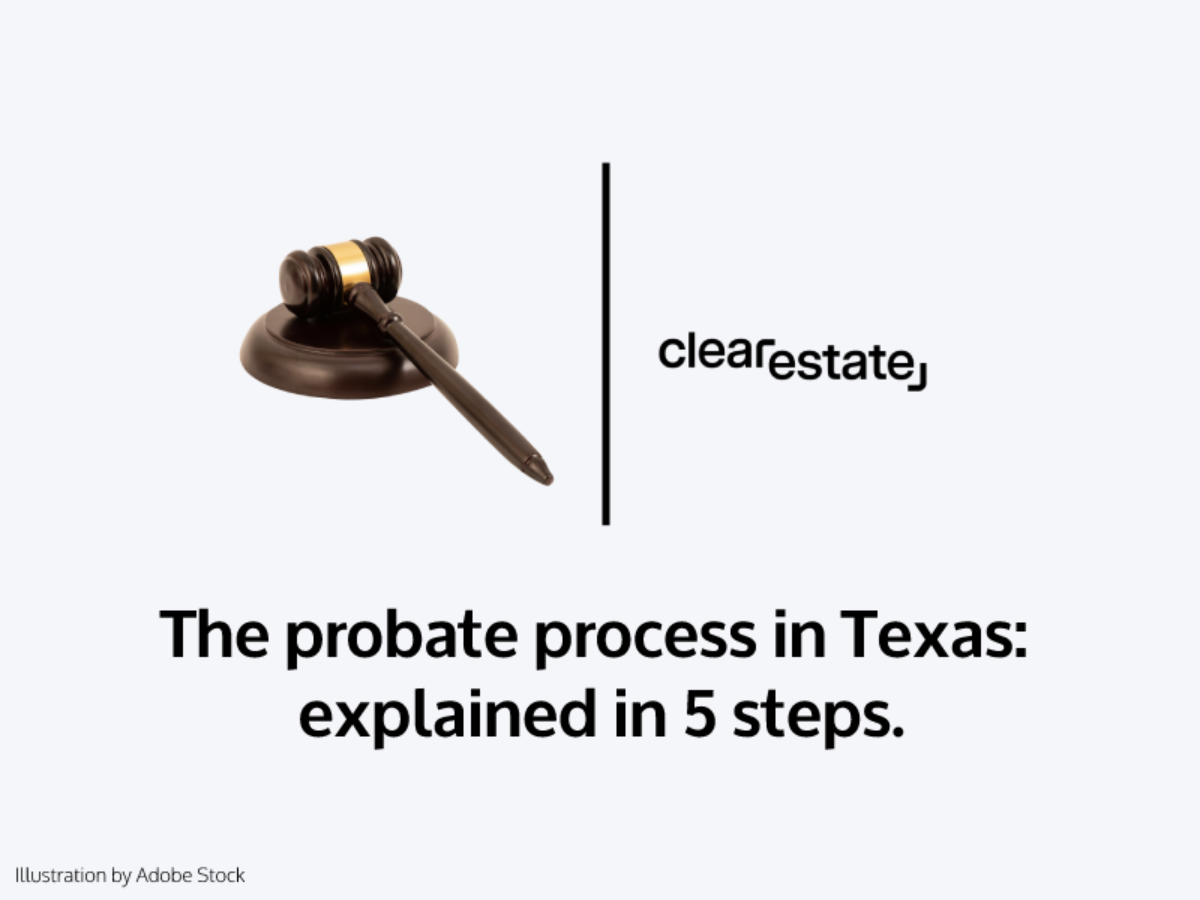Estate Settlement
Dec 04, 2024
How to Stop Mail for a Deceased Person: 5 Steps
Learn how to stop mail for a deceased person with our 5-step guide to protect their identity and ease estate management.
Going through probate in Texas can feel like an uphill battle. In this guide we have laid out the probate process in Texas in 5 simple steps.


In Texas, understanding the probate process is vital to ensuring a smooth transition of assets and settling the deceased's affairs.
Probate, in essence, is a legal procedure that validates a will, if one exists, and oversees the distribution of assets in accordance with the will or state law. It serves to ensure that the deceased's debts are paid, taxes are settled, and assets are correctly transferred to the rightful heirs.
However, this process is often not as straightforward as it may seem. From the complexities of estate law to the nuances specific to Texas, there are potential pitfalls that can make the task even more challenging.
In Texas, the probate process becomes necessary when the decedent's estate includes assets that were titled solely in their name. This is because, according to the Texas Estates Code section 256.001, a Will is not effective to prove title to or the right to possession of any property disposed of by the Will until the Will has been admitted to probate.
This means that beneficiaries cannot access the decedent’s accounts or sell the decedent’s property based solely on the existence of a Will. The Will must first be probated to give beneficiaries the legal right to these assets. Institutions where the decedent held accounts, and potential buyers of the decedent’s property, require the assurance that the Will is valid and that the property transfer is legal. They will not release accounts or agree to purchase property without the assurances that court proceedings provide.
Therefore, even if a valid Will exists, it must go through the probate process to effectively transfer the decedent's assets to the beneficiaries. If there's no Will, the estate will still go through probate, and the assets will be distributed according to Texas intestacy laws.
The probate process in Texas can be complex, and it's often beneficial to consult with a probate attorney to understand the best course of action for your specific situation.
The initial stride in the Texas probate journey is filing an application with the county clerk in the decedent's residential county.
Termed either as the "Application for Probate of Will and Issuance of Letters Testamentary" or the "Application for Administration and Issuance of Letters of Administration" (when a will is non-existent), this document serves as the formal introduction to the probate process. Adhering to the Texas Estates Code Section Sec. 301.002, this application must be submitted within four years post the decedent's demise.
Following the submission, a compulsory hiatus of roughly two weeks is observed before a hearing can be scheduled. This buffer provides room for potential challenges to the will or objections to the appointment of the executor.
Transitioning to the next stage involves the designation of either an executor (should a will exist) or an administrator (absence of a will).
The executor is commonly mentioned in the will, whereas an administrator is nominated by the court. The assignee then receives "letters testamentary" or "letters of administration," thus authorizing them to administer the probate process.
Subsequently, the executor or administrator is tasked with the compilation of an exhaustive inventory featuring the decedent's assets. This compilation spans real estate, personal belongings, bank deposits, and any other assets.
Each asset necessitates an appraisal for determining its fair market value at the time of the decedent's death. As stipulated by the Texas Probate Code Section 309.051(a), this inventory should be filed with the court within 90 days of the appointment of the executor or administrator.
Upon the inventory and appraisal's completion, the executor or administrator is required to settle any lingering debts and taxes from the estate's assets. This covers any income tax due at the decedent's time of death, estate taxes, and personal debts.
certain assets such as life insurance proceeds are typically exempt from debt payment unless explicitly stipulated by the will.
After the successful payment of all debts and taxes, the residual assets can be allocated to the decedent's heirs or beneficiaries as prescribed in the will. In cases where a will is absent, the assets will be apportioned according to Texas intestacy laws. Navigating this process can be intricate, particularly with multiple heirs or potential disputes over distribution.
To illustrate, if the decedent was married with children, the surviving spouse would conventionally receive all of the community property. The decedent's separate personal property would be segmented, with a third allotted to the spouse and two-thirds to the children.
| Timeline (Months) | Step | Description |
| Month 1 | Step 1: Filing for Probate | The process begins with filing an application with the county clerk in the decedent's residential county. This application initiates the probate process. |
| Month 1-2 | Waiting Period | After filing the application, there is a mandatory waiting period of about two weeks before a hearing can be scheduled to allow for potential challenges to the will or objections to the appointment of the executor. |
| Month 2 | Step 2: Designation of Executor or Administrator | The court appoints an executor (if a will exists) or an administrator (if there is no will). The appointee receives "letters testamentary" or "letters of administration," authorizing them to administer the probate process. |
| Month 2-5 | Step 3: Estate's Inventory Compilation and Valuation | Over the next few months, the executor or administrator compiles an exhaustive inventory of the decedent's assets. Each asset's fair market value at the time of the decedent's death is determined. This inventory should be filed with the court within 90 days of the executor or administrator's appointment. |
| Month 5-9 | Step 4: Settlement of Outstanding Debts and Taxes | Once the inventory is complete and appraised, the executor or administrator uses the estate's assets to settle any outstanding debts and taxes. This includes income tax due at the time of the decedent's death, estate taxes, and personal debts. |
| Month 9-12 | Step 5: Allocation of Residual Assets | After all debts and taxes have been paid, the remaining assets are distributed to the decedent's heirs or beneficiaries as specified in the will. In the absence of a will, assets are distributed according to Texas intestacy laws. This process can extend into the final months of the first year. |
In general, the probate process takes up to 1 year to complete in Texas.
** Please note that this timeline is approximate. The actual duration of the probate process can vary depending on the complexity of the estate, the efficiency of the executor or administrator, and whether any disputes or complications arise.
In Texas, there are several types of probate administration available, each suited to different circumstances. Understanding these types can help you navigate the probate process more effectively. The three primary types of probate administration in Texas are Independent Administration, Dependent Administration, and Muniment of Title.
Independent Administration is the most common type of probate administration in Texas. It is often preferred due to its efficiency and cost-effectiveness. In this process, the executor or administrator is given a significant amount of autonomy to manage and settle the estate without court supervision. This means they can sell assets, pay debts, and distribute the estate to beneficiaries without seeking court approval for each action.
A will often specifies the desire for independent administration. If it doesn't, and if all heirs are in agreement, they can request the court to allow independent administration. However, it's important to note that this type of administration requires a high level of responsibility and integrity from the executor or administrator, as they will be operating with less oversight.
Dependent Administration is less common and is typically used when there is a contested will, complex estate, or disagreement among the heirs. In this type of administration, the executor or administrator must seek court approval for virtually every action taken, from selling assets to paying debts.
While this process provides a higher level of oversight, it can also be more time-consuming and expensive due to the increased involvement of the court. The court's close supervision can help prevent mismanagement of the estate and protect the interests of all involved parties.
Muniment of Title is a unique form of probate administration used in Texas. It is the simplest and most cost-effective method, but it can only be used in specific circumstances. This process is used when the decedent left a valid will, there are no unpaid debts (excluding those secured by real estate), and there's no need for a traditional administration.
In a Muniment of Title proceeding, the court admits the will to probate but does not appoint an executor or administrator. Instead, the will serves as evidence of the transfer of title to the estate's assets. This process is often faster than other types of probate administration, but it requires that the estate's circumstances be relatively straightforward.
In conclusion, the type of probate administration chosen in Texas will depend on the specifics of the estate and the decedent's will. It's crucial to consult with a probate attorney to determine which type of administration is most appropriate for your situation.
There have been several occasions where we find investment accounts/bank accounts with 10's of thousands in it that was not listed in the assets of the will and no one even knew it existed.
So, it's important not to shred anything right away and to thoroughly examine each document.
Organization and Time Management: Executors should organize any paperwork related to the estate as soon as possible. Probate can take many months to complete, so executors should have plenty of time set aside for the job. Executors should also keep copies of all documents filed with the court and make sure that original files are kept in a secure location in case they need to be referenced later on.
As you can see, the probate process in Texas is multifaceted, you're not just dealing with the court system - but also government agencies, communicating with beneficiaries, and upholding the legacy of the deceased. As an executor or administrator, probate can sometimes feel like an uphill battle.
This is where our firm steps in. Equipped with a team of expert probate professionals, we offer you a beacon of guidance through the intricacies of Texas estate law, minimizing the stress and uncertainty associated with probate.
Book your free consultation with us and experience the difference expert guidance can make.
 Simplify Probate Today
Simplify Probate Today
Get expert guidance from our specialists who've helped 10,000+ families.
Book a free consultation